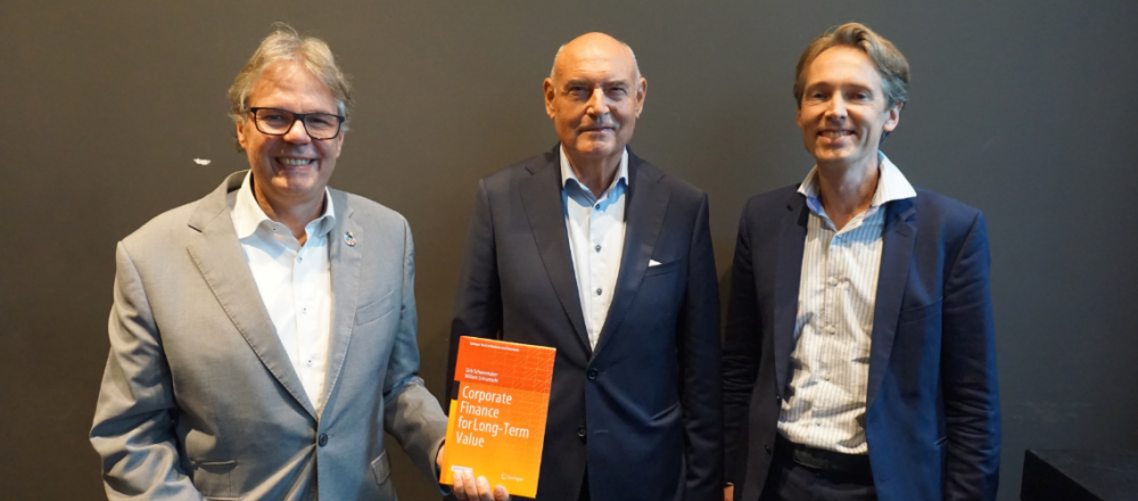The launch at the Atrium in Amsterdam featured discussions with practitioners, journalists, and fellow academics, followed by questions from the audience. Speakers included Janneke Hermes, CFO at Gasunie; Prof. Abe de Jong of the University of Groningen; Nikki Trip, sustainability specialist at AF Advisors; and Prof. Barbara Baarsma of the Universiteit van Amsterdam.
Both co-authors are closely connected with the Erasmus Platform for Sustainable Value Creation (EPSVC), a specialist research centre at RSM. Schoenmaker is Academic Director, and Schramade is a Fellow. Their latest publication follows a successful earlier book in 2019, Principles of Sustainable Finance which lays out why businesses should move from simply maximising financial value to optimising integrated value.
Positive and needed but still scepticism
The book received an overwhelmingly positive reception from the audience. Their feedback included questions about the application of the proposed methods described in the book in general, how they are applied to specific investment and financing decisions, and how these new perspectives could lead to more innovative thinking. Some thought the business world would hesitate to accept a long-term perspective in which social and environmental values equate to financial value, and there was scepticism about the concept of monetising social and environmental factors. The consensus within the audience seemed to be that the book is necessary for steering the discussion towards actionable methods instead of more talk.
‘Managers are excellent sheep’
Introducing the event, Jeroen Smit said provocatively: “Managers are excellent sheep; they are very good in using the standard Net Present Value (NPV) method but lack the fantasy needed to make environmental value (EV) and social value (SV) work.”
Prof. Schoenmaker said some companies “are already too late in changing their strategy and business model. Integrated value – combining financial, social and environmental value – helps companies to future-proof their business model.
“Current corporate finance is good at calculating decisions under the status quo. Our new approach with integrated value provides a dynamic perspective. It argues that current external social and environmental impacts will very likely be internalised at some point in the future,” he said.
Janneke Hermes said Gasunie was already applying methods proposed in the book, and considering the company’s positive environmental impact when deciding on their investments in green gas (such as hydrogen) and carbon capture and storage.
Prof. Abe de Jong described how the integrated value approach relates to academic corporate finance. He called the book ‘a useful cookbook’ for responsible managers and called the normative approach for purpose-oriented decision-making ‘revolutionary’, but pointed out it made no distinction between enterprises and corporations. He suggested ideas for designing purpose-driven corporations.
Nikki Trip highlighted diversity in the financial sector and pointed out the lack of age representation in the boards of Dutch pension funds. She urged better education on long-term value creation, both academically and professionally, and explained how asset managers should incorporate it into their strategy and governance.
It’s a board responsibility
Barbara Baarsma talked of the Dutch corporate governance code that has increased management boards’ responsibility for long-term value creation, and for their corporate impact on people and the environment. Her presentation highlighted that the quantification and monetisation of impact, as defined in Schoenmaker and Schramade’s book, is increasingly considered as the responsibility of managers.
Useful for making a shift in mindsets
From the resulting discussions and comments from the audience, the conclusion is that the book’s perspective is inspiring and valued by practitioners. Prof. Willem Schramade said: “Applying integrated value can be done: the book shows the methods, and companies have the data to do it. The main bottleneck is a mental one: the unwillingness to think differently.”
The authors presented the first copy of the book to Herman Wijffels, economist and founder of the Sustainable Finance Lab, who gave his perspective: society went from scarcity of financial capital and abundance of natural capital to an abundance of financial capital and scarcity of natural capital, he said, and commented that this development underpins his belief that it is a collective responsibility to put natural capital at the centre of future development. The book is a useful tool to make this shift in mindset.
Students at RSM have already started using the book in the core course ‘Corporate Finance’ in the MSc Finance & Investments, and Prof. Abe de Jong said that he used the book the previous week in his own finance lecture at the University of Groningen.
About the book
Corporate Finance for Long-Term Value is a concise handbook for companies that want to create long-term value. It has been written for business and finance managers, but the authors have kept in mind undergraduate and graduate students of finance, economics, and business administration. It is also free to download or open in PDF format.
It demonstrates how to apply the new paradigm of integrated value. The basic methods of corporate finance remain the same but are now expanded to include social and environmental factors alongside financial factors. Examples throughout the book show how these methods work with integrated value.
It builds on recent academic literature on sustainable companies and starts by analysing the United Nations’ 17 Sustainable Development Goals (SDGs) as a strategy for the transition to a sustainable economy. It translates the general concept of sustainability into core corporate finance methods, such as net present value, company valuation, cost of capital, capital structure and M&A.
Free download or hardcover book
The book is available as a free download. It is also available as a hardcover book from Springer as part of its series Springer Texts in Business and Economics using this link: https://link.springer.com/book/9783031350085

